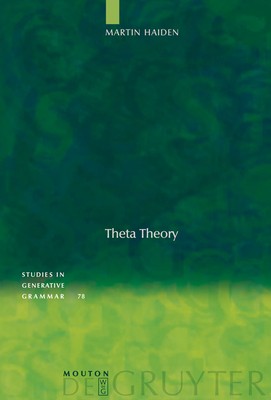
- We will send in 10–14 business days.
- Author: Martin Haiden
- Publisher: Walter de Gruyter
- ISBN-10: 3110182858
- ISBN-13: 9783110182859
- Format: 16.6 x 23.6 x 2.1 cm, hardcover
- Language: English
- SAVE -10% with code: EXTRA
Reviews
Description
Theta Theory explores the lexicon as an interface in the strict sense, as facilitating the flow of information between cognition and the computational system of language. It argues for the traditional concept of a listed lexicon, where semantic roles are encoded as features of verbs, and against event decomposition.
Part one of the book discusses the link between cognition and the lexicon. Mainstream theories of lexical semantics are critically reviewed. Furthermore, this part provides an extensive description of the relevant data in German, including agentivity, causation, psychological predicates, and different types of diathesis alternations.
Part two is devoted to the link between the lexicon and syntax. It develops a parallel model of grammatical derivation, which allows the formulation of robust generalizations over thematic role assignment, but at the same time acknowledges the relevance of other components, in particular morpho-phonology and narrow syntax. The theory is applied to a wide range of German constructions including modal infinitives, the present and gerundive participle, the past/passive/adjectival participle, verbal particles, auxiliary selection, and unaccusatives/reflexives.
The book is of interest for students and scholars of lexical semantics, for descriptive German linguistics, and for linguists concerned with the development of the Minimalist Program.
EXTRA 10 % discount with code: EXTRA
The promotion ends in 10d.07:42:32
The discount code is valid when purchasing from 10 €. Discounts do not stack.
- Author: Martin Haiden
- Publisher: Walter de Gruyter
- ISBN-10: 3110182858
- ISBN-13: 9783110182859
- Format: 16.6 x 23.6 x 2.1 cm, hardcover
- Language: English English
Theta Theory explores the lexicon as an interface in the strict sense, as facilitating the flow of information between cognition and the computational system of language. It argues for the traditional concept of a listed lexicon, where semantic roles are encoded as features of verbs, and against event decomposition.
Part one of the book discusses the link between cognition and the lexicon. Mainstream theories of lexical semantics are critically reviewed. Furthermore, this part provides an extensive description of the relevant data in German, including agentivity, causation, psychological predicates, and different types of diathesis alternations.
Part two is devoted to the link between the lexicon and syntax. It develops a parallel model of grammatical derivation, which allows the formulation of robust generalizations over thematic role assignment, but at the same time acknowledges the relevance of other components, in particular morpho-phonology and narrow syntax. The theory is applied to a wide range of German constructions including modal infinitives, the present and gerundive participle, the past/passive/adjectival participle, verbal particles, auxiliary selection, and unaccusatives/reflexives.
The book is of interest for students and scholars of lexical semantics, for descriptive German linguistics, and for linguists concerned with the development of the Minimalist Program.


Reviews